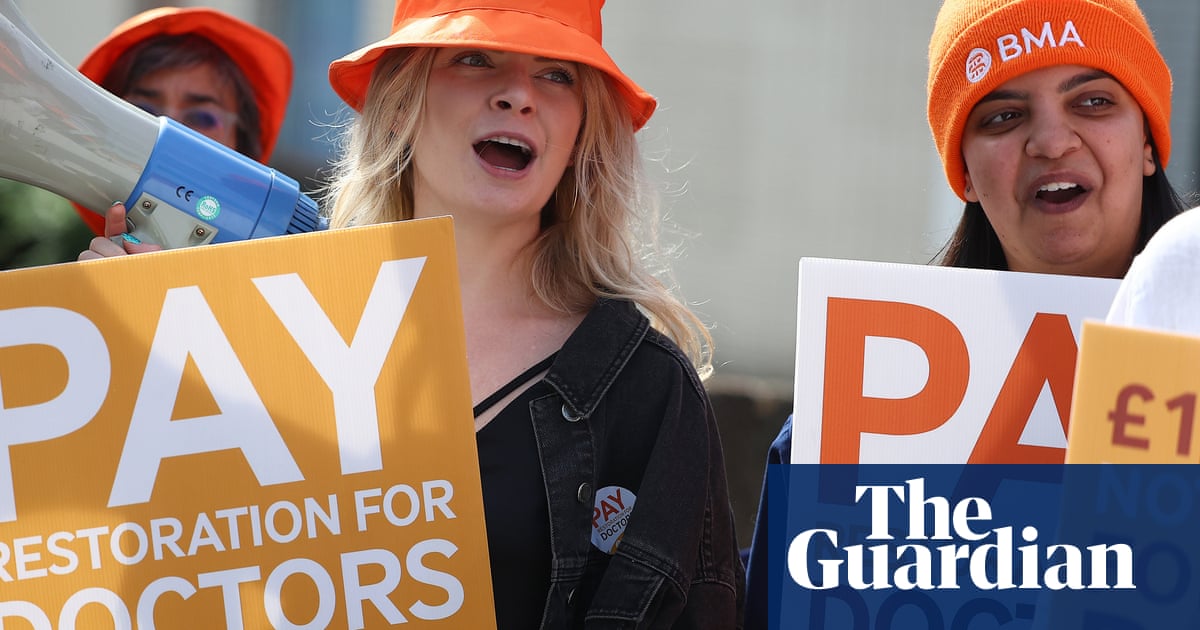Six senior figures in England’s medical profession have criticised potential strikes by resident doctors as “a futile gesture” that will harm patients and help those who oppose theNHS.
The move is the first public evidence of the significant unease many senior doctors feel about the possibility of their junior colleagues staging a new campaign of industrial action in England.
In a letter to the Guardian the six medics and former medics say resident – formerly junior – doctors’demand for a 29% pay riseis unaffordable, given the government has “no spare money”.
The signatories include Sir John Oldham, a health adviser to several governments, Dr Clare Gerada, a former chair of the Royal College of GPs who also served on the BMA’s ruling council, and the public health expert Prof John Ashton.
Their letter comes as the British Medical Association (BMA)ballots resident doctors in Englandabout striking again, as they did in 2023 and 2024. The co-chairs of the BMA’s resident doctors committee (RDC) have urged their estimated 55,000 members to vote for the action.
The six experts say there was a genuine case for resident doctors to receive a big salary increase after years of erosion in the value of their pay, but that it had largely been addressed by the 22% they received last year for 2023/24 and 2024/25 and the average 5.4% they were given last month for 2025/26.
They also say the RDC leaders’ call for resident doctors to back a fresh six-month campaign of walkouts is mistaken. “A strike now would harm patients and diminish the cause of these doctors. The calls for strike misjudge the mood in the country. There is no spare money. This is a futile gesture guiding people into a maze without a thread”, they write in their letter.
“In our view the NHS is at a more perilous state than at any time in our careers. A doctors strike would further diminish the ability of the NHS to deliver, and play into the hands of those who don’t believe in an NHS – publicly funded [and] based on need not want.
“We urge resident doctors to keep to the spirit of the Hippocratic oath – vote for the NHS and vote No to strike action.”
The other signatories are David Colin-Thome, the Department of Health’s national clinical director for primary care under Tony Blair and Gordon Brown; Dr James Kingsland, a GP and former ministerial adviser; and Dr Fiona Cornish, a senior GP in Cambridge and former member of the BMA’s GP committee.
The health secretary, Wes Streeting, appointed Oldham, who worked for the previous Labour and coalition governments, as a senior adviser in March on his plans to create more “neighbourhood health” services as part of the government’s forthcoming 10-year plan for the NHS.
Responding to the letter, Streeting urged resident doctors to reject industrial action in their ballot, which ends on 7 July.
“Strikes should only ever be a last resort. Resident doctors have had a 28.9% pay rise [since 2022/23], and they have a government working with them to improve their career progression and conditions.
Sign up toFirst Edition
Our morning email breaks down the key stories of the day, telling you what’s happening and why it matters
after newsletter promotion
“I say to the BMA: the government has changed, our policies have changed, your tactics need to change too. Instead of cutting the NHS recovery off at its knees, work with us to turn the health service around”, he said.
However, RDC co-chairs Dr Melissa Ryan and Dr Ross Nieuwoudt, said this year’s 5.4% pay award – the biggest in the public sector – was too little to help them restore the lost value of their earnings since 2008.
“Resident doctors are currently paid 23% less than they were in 2008. Even after this year’s pay award it would still need a rise of 26% to bring pay back to that level.
“We don’t believe any of the doctors in this letter are worth 23% less than they were in 2008, and neither presumably do they. The question, then, is how we restore the value of this profession, how quickly, and how we work with government to get there.
“At the rate Wes Streeting is suggesting it would take more than a decade to restore our pay. The NHS does not have that time,” they said.
